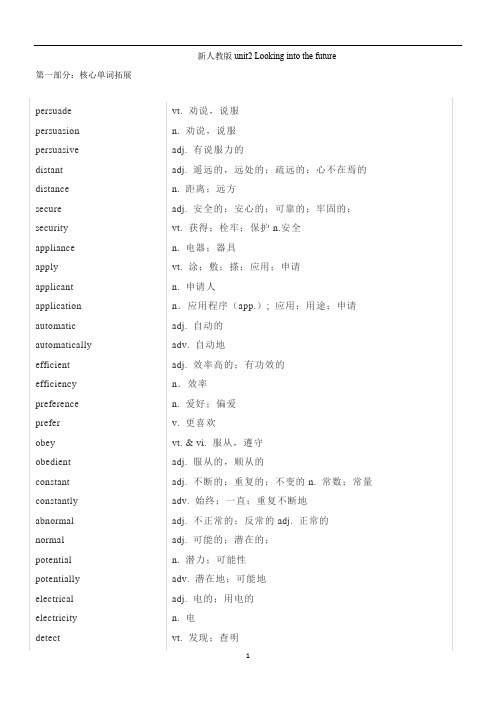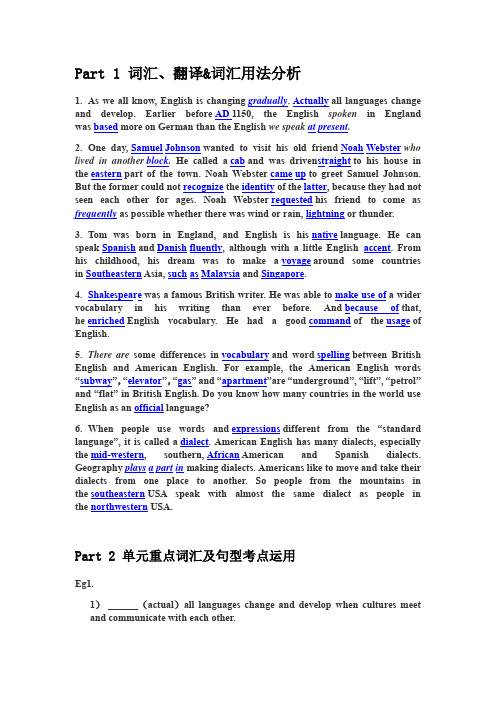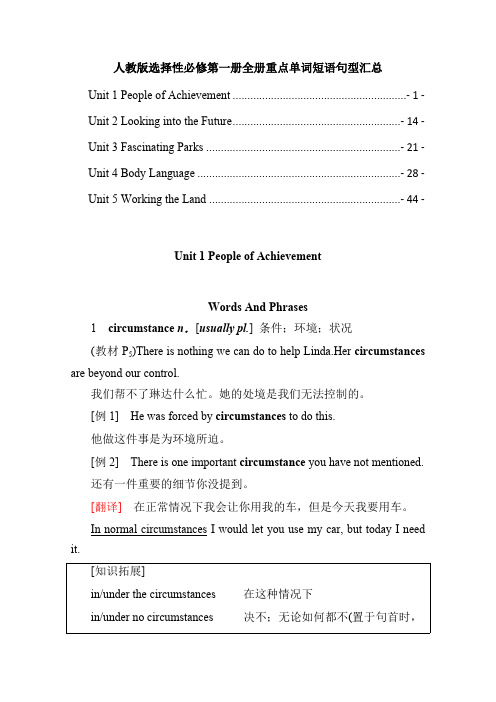高中英语 人教版选修第一册unit2重点句型和语法讲解
人教版高中英语选择性必修一 Unit 2 单元重点回顾

prediction n.预言;预测;预报;预告 make a prediction for 对……做出预言/预测 9.forecast vt.& n.预测;预报
4.preference n.爱好;偏爱 have a preference for
偏爱
prefer vt.更喜欢
prefer sth to sth与某物相比更喜欢某物
prefer to do/doing sth更喜欢做某事
prefer doing sth to doing sth宁愿做某事而不愿做某事
switches on and off...
3.However,I could not help but
feel anxious.
4. Better not hang out with Sam then.
5.Nevertheless,I will always look on the positive side of change and
absent adj.缺席的;不在的;心不在焉的be absent from 缺席
-7-
单元重点回顾
主题语境 重点词汇 重点句型 重点语法
13.advocate vt.提倡;支持;拥护 n.提倡者;支持者;拥护者
advocate sth/doing sth主张(做)某事
advocate that...(should)do sth主张/提倡……做某事
in a
高中英语 新人教版选修性必修第一册 Unit2 Looking into the future高频词汇拓展和单元话题词块总结

新人教版unit2 Looking into the future 第一部分:核心单词拓展persuade persuasion persuasive distant distance secure security appliance apply applicant application automatic automatically efficient efficiency preference preferobey obedient constant constantly abnormal normal potential potentially electrical electricity detect vt. 劝说,说服n. 劝说,说服adj. 有说服力的adj. 遥远的,远处的;疏远的;心不在焉的n. 距离;远方adj. 安全的;安心的;可靠的;牢固的;vt. 获得;栓牢;保护n.安全n. 电器;器具vt. 涂;敷;搽;应用;申请n. 申请人n.应用程序(app.); 应用;用途;申请adj. 自动的adv. 自动地adj. 效率高的;有功效的n.效率n. 爱好;偏爱v. 更喜欢vt. & vi. 服从,遵守adj. 服从的,顺从的adj. 不断的;重复的;不变的 n. 常数;常量adv. 始终;一直;重复不断地adj. 不正常的;反常的adj. 正常的adj. 可能的;潜在的;n. 潜力;可能性adv. 潜在地;可能地adj. 电的;用电的n. 电vt. 发现;查明第二部分:词块 persuade sb. (not) to do sth.说服某人(不)做某事persuade sb. into (out of ) doing sth.说服某人(不)做某事 in the distance 在远处;在远方at a distance 保持一定距离detectordetectivefantasyfantasticcombinecombinationpredictpredictionoccupationoccupyoccupiedopposeopposedabsenceabsentemphasisemphasizeresistresistanceresistantaccurateaccuracylibrarianlibraryn. 探测器 adj. 侦查的;刑侦的 n. 侦探 n. 幻想;想象 adj. 怪诞的;异想天开的;了不起的,极好的 vt. & vi. (使)结合;混合 n. 结合;混合 v. 预测;预言;预料 n. 预测;预言;预料 n. 职业;占领 vt. 占领;使忙于(某事) adj. 被占领的;忙碌的(busy ) vt. 反对;抵制;阻挠 adj. 反对的;截然不同的 n. 不存在;缺乏;缺席 adj. 缺席的;不存在的;心不在焉的 n. 强调;重视;重要性 vt. 强调;重视 vt. 抵制;反抗;抵挡 n. 抵制;反对;抗拒 adj. 抵制的;反抗的;有抵抗力的 adj. 精确的;准确的 n. 精确;准确 n. 图书管理员;图书馆馆长 n. 图书馆have /show (a) preference for偏爱command sb. to do sth.命令某人做某事command that sb. (should) do sth命令某人(应该)做某事have a good command of精通;掌握detective novel侦探小说catch fire着火(动作)be on fire着火(状态)available resources/facilities可获得的资源/设施combine A with B把A与B结合oppose (doing) sth.反对(做)某事be opposed to (doing) sth.反对(做)某事In the absence of在缺乏...的情况下be absent from class/work缺课/旷工advocate (doing) sth提倡(做)某事keep in touch with...与...保持联系get in touch with...与...取得联系lose touch with...与...失去联系。
2023-2024人教版高中英语选择性必修第一册第二单元 单词详解

normal adj. 正常的;平常的
15. critical : adj. 严重的; 关键的; 批判性的
critical point 转折点 be critical to sth. 对…至关重要 be critical of 对…持批评的态度
money. 3)The factory is very efficient at making medicine.
8. preference n. 爱好; 偏爱
have a preference for...: 喜欢
prefer (-rred/-rring) v. 宁愿; 更喜欢
prefer doing A to doing B: 喜欢做A事胜过做B事 prefer to do A rather than do B
command sb. to do sth. 命令某人做某事 command that…【should】do sth. [从句用虚拟语气]
desire, suggest, propose, recommend, order/instruct/command, demand, request, require, ask, urge(强烈要求), insist(坚决要求), advocate(主张)等接that宾语 从句时, 从句用 should do/be 结构, should可省。
对某人冷淡
distantly adv. 遥远地,冷淡地
4. secure adj. 安全的; 安心的;可靠的; 牢固的
vt. 获得; 拴牢; 保护 be/feel secure about 对…有把握 be secure against/from sth. 免遭某事/没有…的危险 secure sth. against/from sth. 保护某物免遭… secure sth. to sth. 把…栓牢在… security n. 安全
人教版高中英语必修一 unit 2 单元重点词汇及句型

Part 1 词汇、翻译&词汇用法分析Part 2 单元重点词汇及句型考点运用Eg1.1)(actual)all languages change and develop when cultures meet and communicate with each other.2)Growing vegetables looks easy, but (actual)it takes a lot of learning.Key: 1)actually 2)actuallyActually, adv.实际上,事实上,相当于in actual fact,as a matter of fact, infact,in reality等,actual为其形容词,做题注意分析句子中所需词性。
Exercise 1.There is a big difference between what they have said and what they have (actual)done.Exercise 2.He looks younger than his wife, but in (actually)fact, he is a lot older.Exercise 3. (actual),reading skills should be based on the knowledge of English writing.Eg2.1)It was (base) on German than the English we speak atpresent.2)They settled down at the base the mountain.3)Do you know where the air is?Key: 1) based 2) of 3)basebase v. 以...为根据base...on/upon,被动形式为be basedon/uponn. 基地,基础at the base ofExercise 1.We have all kinds of summer camp for your holidays. Youcan choose one (base)on your own interests.Exercise 2. (base)on a true story, the film attracts manypeople, whether they are old or young.Exercise 3. (base)an important decision more on emotion thanon reason, you will regret it sooner or later.Eg3.说出下面句子中present的意思分别为什么1)The present president present at the meeting presented us withpresents.present:adj:现在的&出席的 at present;到场的v.:颁发;把...交给... ; present sb. with sth. 呈现n.: 礼物 present sth. to sb.根据present的用法完成下列句子Exercise 1.I’m getting along well with my classmates .Exercise 2.The headmaster a medal each winner.Eg4.1)Every minute should be (make)of to study.Key: 1) madefull/good充分利用:make+ the best use ofthe mostExercise 1.You’d better (利用空闲时间)to gooutdoors.Exercise 2.Every possible use should be made advancedtechnologies.Eg5.1)He presented two solutions. The (后者) seemed muchbetter.2)The former question is more difficult for me than the one. Key: 1)latter 2)latterlatter n.(两者中的)后者(与the连用)adj.(两者中)后者的固定结构:the former...the latter... 前者...后者...Exercise 1.I have two friends, Mary and Lily. (前者)is good at dancing, (后者)can speak Danishfluently.Exercise 2.If I were forced to choose one of the two, I would prefer Latter.Eg6.1)The old man is concerned about many teenagers, (例如)John, Peter and Tom.2)Tom doesn’t like sports. (例如),he is never seen toplay on the playground.Key:1)such as 2)For examplesuch as 用于列举前面提到的事物的一部分for example 用于举例说明,可以置于句首、句中或句末Exercise 1.Young people are encouraged to take part in team sports Football and basketball.Exercise 2.What would you do if you met a wild animal, a tiger,?Eg7.1)I (frequent)join in class discussions and talk withmy partner about problems of teenagers.2)More and more Chinese people can speak (fluently)English.Key:1)frequently 2)frequentfrequently adv.经常,频繁地其adj.为frequentExercise 1.Tom has studied English in London for many years and nowshe can speak English (frequent).Exercise 2.He made (fluently)visit to his grandparents.Eg8.1)Computers play important part in modern society.2)The actress was invited to play role in this TV playbased on a true story.Key:1)an 2)aplay a part/role in 在...中起作用;在...中扮演角色Exercise 1.Petrol (在...中起重要作用)our daily life.Exercise 2.He played important part in the TV SERIES.Eg9.1)The moment I answered the phone, I (recognize)hisvoice.2)It is (recognize)that the environment pollution hasbecome more and more serious.Key:1)recognized 2)recognizedrecognize vt.辨别出;辨认出;承认;公认 be recognized as... 被认为是...It is recognized that...人们公认...recognition n. beyond/out of recognition(变得)完全认不出来Exercise 1.Twenty years has gone and my hometown has changed beyond (recognize).Exercise 2.Believe it or not, Lily came up to me yesterday, but Ididn’t (认出)her at first.Eg10.1)When people use words and (express)different fromthe “standard language”, it is called a dialect.2)Young children often have difficulty (express)themselves.Key: 1)expressions 2)expressingexpression n.词语;表达;表情facial expressionexpress v.表达;快递 have difficulty (in) doingexpressive adj.有表现力的Exercise 1.In order to lear n English well, you’d better use important (express) frequently in everydaylife.Exercise 2.You should give (express)to your feelings in your speech.Exercise 3.The ability (express)an idea is important asthe idea itself.Exercise 4.A worried (express) crossed her face.Eg11.1)The manager requested that all the dusty curtains(be)washed.2)The general gave a command that they (start) at once.Key: 1)(should) be 2)(should) startcommand作“命令”讲,request作“请求,要求”讲时,that从句要用虚拟语气,即动词用“(should)+动词原形”,should可以省略。
高一英语新人教选择性必修一知识点盘点 Unit 2

选择性必修第一册 Unit2 Looking into the Future Part A 重点词汇1. persuade vt.劝说;说服用法:persuade sb. to do sth. = persuade sb. into (doing) sth. 说服某人做某事persuade sb. (not) to do sth. = persuade sb. out of (doing) sth. 说服某人不做某事persuade sb. of ... = persuade sb. (that) 使某人信服2. distant adj. 遥远的; 远处的;疏远的;心不在焉的用法:be + 距离+ distant from ... 离...(有...)远转化:→ distance n.[C,U]距离;远处in the distance 在远处→ distantly adv. 遥远地;冷淡地3. secure adj. 安全的;安心的;可靠的;牢固的vt. 获得;拴牢;保护用法:feel secure about... 对...感到安心be secure against/from... 没有...的危险secure ... against... 保护...免于受到...(危害)转化:→ insecure adj. 不安全的;缺乏信心的→ securely adv. 安全地;安心地;牢固地;有把握地→ security n.[U]安全;平安4. preference n.爱好; 偏爱用法:have a preference for ... 偏爱......in preference to ... 优先于......;而不是......give (a) preference to ... 给......以优惠;优待......转化:← prefer v. 更喜欢...;喜欢...多于...→ preferable adj. 更可取的,更适合的5. command n.指令; 命令; 控制vt.命令; 控制用法:(be) in command 指挥,控制take/have command 控制,开始指挥under one’s command/under the command of 由某人统率/指挥6. monitor vt.监控;监督;监听n.班长;调查员;显示器;监视器7. warning n. 警告;警示;先兆转化:↔ warning adj.警告的;告诫的← warn n.&v. 警告,告诫;提醒注意8. detect vt.发现;查明转化:→ detective n. 侦探→detection n.察觉,侦测,发现9. available adj.可获得的;可购得的;可找到的;(人)有空的用法:be available for sth. 可用于...be available to do sth. 可以做某事...be available to/for sb. ...对某人来说是可以获得的bine vt & vi.(使)结合;混合用法:combine ... and/with ... 使……与……相结合11. predict vt.预测; 预言; 预料prediction n.预测;预言13. oppose v.反对;抵制;阻挠14. advocate vt. 提倡;支持:拥护用法:advocate (doing) sth.advocate that ... 提倡; 主张15. resist vi. & vt.抵制;反抗;抵挡用法:can’t resist (doing.) sth.转化:→ resistance n.抵制;反对;抗拒→ resistant adj. 有抵抗力的;抵制的Part B 重点短语1. no longer = not ... any longer强调时间上“不再...”,表示状态不再延续。
新教材 人教版高中英语选择性必修第一册全册重点单词短语句型汇总(56页)

人教版选择性必修第一册全册重点单词短语句型汇总Unit 1 People of Achievement...........................................................- 1 -Unit 2 Looking into the Future.........................................................- 14 -Unit 3 Fascinating Parks..................................................................- 21 -Unit 4 Body Language.....................................................................- 28 -Unit 5 Working the Land.................................................................- 44 -Unit 1 People of AchievementWords And Phrases1 circumstance n.[usually pl.]条件;环境;状况(教材P5)There is nothing we can do to help Linda.Her circumstances are beyond our control.我们帮不了琳达什么忙。
她的处境是我们无法控制的。
[例1] He was forced by circumstances to do this.他做这件事是为环境所迫。
[例2] There is one important circumstance you have not mentioned.还有一件重要的细节你没提到。
新人教版高中英语选择性必修一Unit2重点短语和句型学案(学生版)
班级:姓名:B4U2 Looking into the FuturePeriod 2 Key phrases and sentences一.重点短语1.switch off/on 关/开(电灯、机器等)【例句】Have you ever forgotten to switch off the TV or computer? 你是否曾忘记关电视或电脑?练习:②He was so stubborn that he refused to make switch.③我们问他们是否愿意和我们调换位置。
We asked them if they would.④你出门前要把电视关掉。
before you go out.⑤遥控器让你在不同的电视频道之间轻松地转换。
2.catch fire 着火(动作)【例句】These thatched roofs frequently catch fire.这些茅草屋顶屡屡着火。
练习:①A post office was _______ _______ _______ and vehicles were stoned by looters.抢劫犯防火烧了一家邮局,并用石头砸车。
①And he left, because he had to _______ _______ _______.他走了,因为他要去救火。
①It took us a long time to _______ _______ _______ with matches.我们花了好久的时间才用火柴将火生了起来。
3.in this sense (in...sense) 从这种(某种)意义上来讲【例句】In this sense, the home of tomorrow is already the home of today.从这个意义上说,明天的家已经是今天的家了。
练习:① makes sense to work on the problem before it gets out of control.①What you say is true in sense.①这种事情决不能发生在我们学校。
人教版(2019)高中英语选择性必修第一册Unit 2 Looking into the单元知识梳理
一句多译 一到达剧院, 他就发现朋友给他的票忘在家里了。 ③_O_n__a_r_r_iv_i_n_g__a_t _ the theatre, he found the ticket a friend gave him was left at home. (on doing) ④_T_h_e__i_n_s_ta_n_t_/T_h_e__m__o_m_e_n_t_/T_h_e__m__in_u_t_e__ he arrived at the theatre, he found the ticket a friend gave him was left at home. ⑤__H_a_r_d_ly__h_a_d__h_e__a_r_ri_v_e_d__a_t _ the theatrew__h_en_ he found the ticket a friend gave him was left at home. (hardly ... when ...)
补全句子/句式升级 ④ ( 普 通 表 达 )His _a_b_s_e_n_ce__o_f__m__in_d_ ( 心 不 在 焉 ) during driving nearly caused a serious accident. ⑤ ( 高 级 表 达 )_I_t_w__a_s__h_is__a_b_s_en_c_e__o_f__m__in_d__d_u_r_in_g__d_r_i_v_in_g__t_h_a_t __ _n_e_a_rl_y__c_a_u_s_ed___a__s_e_ri_o_u_s__ac_c_i_d_e_n_t._______(强调句型)
完成句子 (2019·浙江卷)我相信我能胜任这份志愿者工作, 因为我精通英语 口语。 ④I believe I am very qualified for this voluntary work, because I _h_av_e__(_a_)__g_o_o_d__co_m__m__an_d__o_f__s_p_o_k_e_n__E_n_g_l_is_h__.
高一英语新人教选择性必修一知识点盘点 Unit 2
高一英语新人教选择性必修一知识点盘点Unit 21. 词汇和短语- mysterious: 神秘的- classical music: 古典音乐- instrumental music: 乐器音乐- traditional: 传统的- folk music: 民间音乐- lyrics: 歌词- melody: 旋律- rhythm: 节奏- harmony: 和声- symphony: 交响乐- orchestra: 管弦乐队- instrument: 乐器- violin: 小提琴- piano: 钢琴- guitar: 吉他- flute: 长笛- drum: 鼓- trumpet: 小号- saxophone: 萨克斯管- tune: 曲调- genre: 风格- pop music: 流行音乐- rock music: 摇滚音乐- jazz: 爵士乐- rap: 说唱音乐- country music: 乡村音乐2. 重点句子- Classical music is usually seen as more sophisticated and refined than pop music.古典音乐通常被认为比流行音乐更复杂且精致。
- The lyrics of a song are the words that are sung.歌词是歌曲中被唱出的词语。
- The melody is the tune of a song.旋律是一首歌的曲调。
- The rhythm of a piece of music is the pattern of the beats.一首音乐的节奏是节拍的模式。
音乐中的和声是同时演奏或演唱的不同音符的组合。
贝多芬是历史上最著名的古典音乐作曲家之一。
3. 研究建议- Listen to different genres of music to expand your musical knowledge.听不同风格的音乐来扩大你的音乐知识。
Unit2ReadingandThinking知识点讲解课件高中英语人教版选择性必修第一册
例句感知
着火
catch fire的用法
1 意为“着火,开始燃烧”,表示动作,不用被动。
2 表示“着火;在燃烧”还可以用on fire,表示状态。
例:Suddenly a pan of oil catches fire. Soon the house was on fire and it was impossible for people to escape.
Unit 2 Looking into the future
Para.4
防止某事发生
short
n. (电线) 短路
词性1
n. 短路;缺乏
short
搭配 词性2
in short 总之; 简言之 for short 作为简称(缩写)
adj. 短的;矮的;短缺的
例句感知
1. The short in our classroom resulted in a panic among us. 2. In short, they’re active learners. 3. We often run short of staff in the summer.
tomorrow is already the home of today. Nevertheless, it will take some years
before most new homes begin to use this new technology.
in this sense
含义
从这种(某种)意义上来讲
语法填空。
考点追击
1. Settlers flooded (flood) from Europe to America in the 19th century.
- 1、下载文档前请自行甄别文档内容的完整性,平台不提供额外的编辑、内容补充、找答案等附加服务。
- 2、"仅部分预览"的文档,不可在线预览部分如存在完整性等问题,可反馈申请退款(可完整预览的文档不适用该条件!)。
- 3、如文档侵犯您的权益,请联系客服反馈,我们会尽快为您处理(人工客服工作时间:9:00-18:30)。
Unit 2LOOKING INTO THE FUTURE
重点句型
1.For example,the phrase in my opinion tells us that the passage is likely meant to persuade.
比如,in my opinion这个短语告诉我们,这篇文章可能意在说服。
2.Or,have you ever forgotten to switch off the TV or computer?
或者,你是否忘记过关电视或电脑?
3.However,in the not-too-distant future,we will be living in smart homes that will lock the door for us when we are away and remember to switch off the TV when we forget.
然而,在不太遥远的未来,我们将生活在智能家居里,它能在我们离开时锁门,在我们忘了关掉电视的时候记得关掉它。
4.These smart homes will keep us secure,save us energy,and provide a more comfortable environment to live in.
这些智能家居将保护我们的安全,节省能源,并提供一个更舒适的生活环境。
5.The future home will use integrated sensors to tell when you leave home each morning,and then go into an energy-efficient mode all by itself.
未来的家将使用集成传感器来判断你每天早上离开家的时间,然后自己进入一个节能模式。
6.Your home will also learn your daily routine and preferences,so everything will be ready for you when you get home each evening.
你的家也会了解你的日常习惯和喜好,所以每天晚上你回家时,一切都会为你准备就绪。
7...your smart home will detect it and provide you with the relevant information.……
你的智能家居将检测到它,并向你提供相关信息。
8.Many of these new innovations are already available and being used in some homes.
许多这些新发明已经存在,并在一些家庭中使用。
8.In this sense,the home of tomorrow is already the home of today.
从这种意义上说,明天的家已经是今天的了。
10.Your lights will come on the instant you enter the door along with your favourite music or TV Programmes,and you will find your dinner already prepared for you.
你一进家门,灯就会亮起,还有你最喜欢的音乐或电视节目(会自动播放),而且你会发现晚餐已为你准备好了
11.For example,the smart home could control the air conditioning and lights so that you would no longer have to turn switches on and off..
.例如,智能家居可以控制空调和灯,这样你就不用再打开和关闭开关了……
12.Care will also be taken to combine the building and surrounding architecture together to form an effective system.
还应注意将建筑物和周围建筑结合起来,以形成有效的系统。
13.However,I could not help but feel anxious.
然而,我不禁感到担心。
14.Better not hang out with Sam then.
最好不要和山姆闲逛。
15.Words such as predict,prediction,and forecast,are also used quite often when making predictions.
做出预测时,经常使用诸如predict,prediction和forecast等词。
16.In the article,various people said that the public should oppose the idea of developing driverless cars.
在文章中,各界人士纷纷表示,公众应该反对发展无人驾驶汽车的想法。
17.On the one hand,there are many different groups of people around the
world who live happily in the absence of new technology.
一方面,世界各地有许多不同的群体在没有新技术的情况下快乐地生活。
18.They advocate a simple life with an emphasis on hard work,family,and community.
他们提倡简单的生活,强调努力工作、家庭和社区。
19.Moreover,the Internet has made it possible for friends and family to keep in touch easily even if they are on opposite sides of the world.
此外,互联网使朋友和家人能够很容易地保持联系,即使他们在世界的另一边。
20.Nevertheless,I will always look on the positive side of change and accept it rather than resist it.
尽管如此,我将永远看到变革积极的一面,接受而不是抵制它。
本单元语法
一、将来进行时的构成
二、将来进行时的构成
1.表示最近或较远的将来正在进行的动作。
Don’t phone him between 5pm and 6pm.He’ll be having a meeting then.下午五点至六点之间不要给他打电话,那时他在开会。
2.表示按计划或安排要发生的动作。
The train won’t be leaving until one o’clock.
火车一点钟才开。
3.常用来表示预计即将发生或势必要发生的动作。
When shall we be meeting next time?
我们下次什么时候见面?
4.表示委婉语气。
Will you be needing anything else?
你还需要什么吗?
三、将来进行时与一般将来时的区别
1.将来进行时表示将来某时正在进行的动作; 而一般将来时表示将来某时将要发生的动作。
如:
What will you be doing at seven the day after tomorrow?
后天晚上七点你会在做什么呢?
What will you do at seven the day after tomorrow?
后天晚上七点你干什么?
2.将来进行时表示已有的安排;而一般将来时表示临时决定。
I’ll go to see him after school.
放学后我去看他。
I’ll be going to see him after school.
放学后我准备去看他的。
